UNIT8 Lesson 45 教学课件--冀教版初中英语八年级下
文档属性
| 名称 | UNIT8 Lesson 45 教学课件--冀教版初中英语八年级下 |
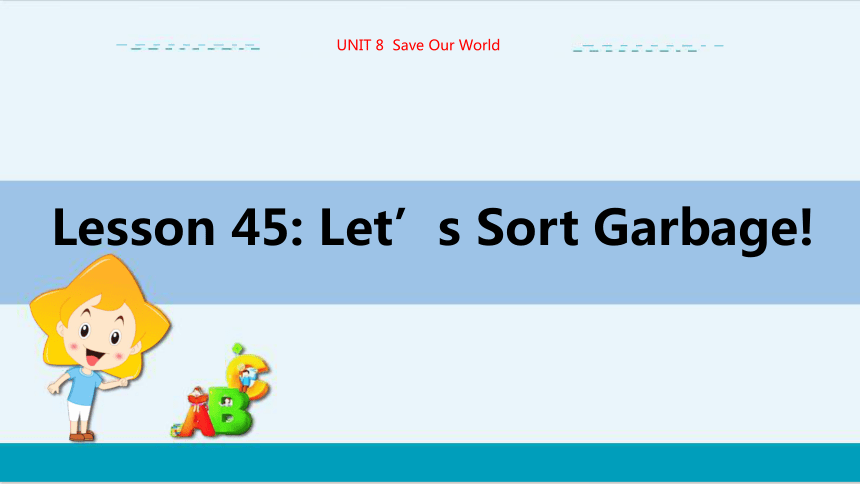
|
|
| 格式 | pptx | ||
| 文件大小 | 2.8MB | ||
| 资源类型 | 试卷 | ||
| 版本资源 | 冀教版 | ||
| 科目 | 英语 | ||
| 更新时间 | 2024-02-21 19:41:02 | ||
图片预览

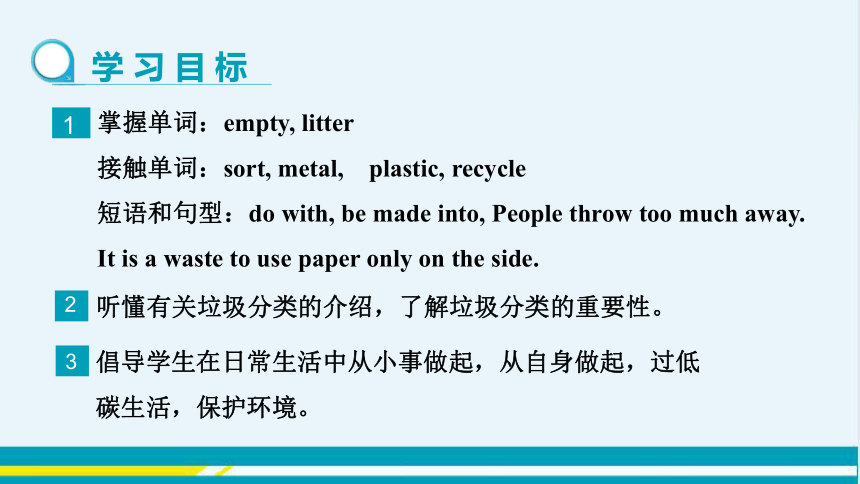
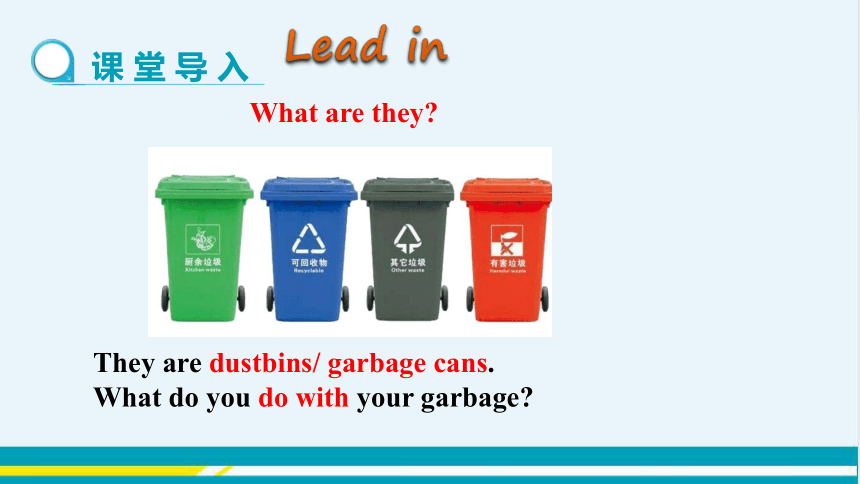
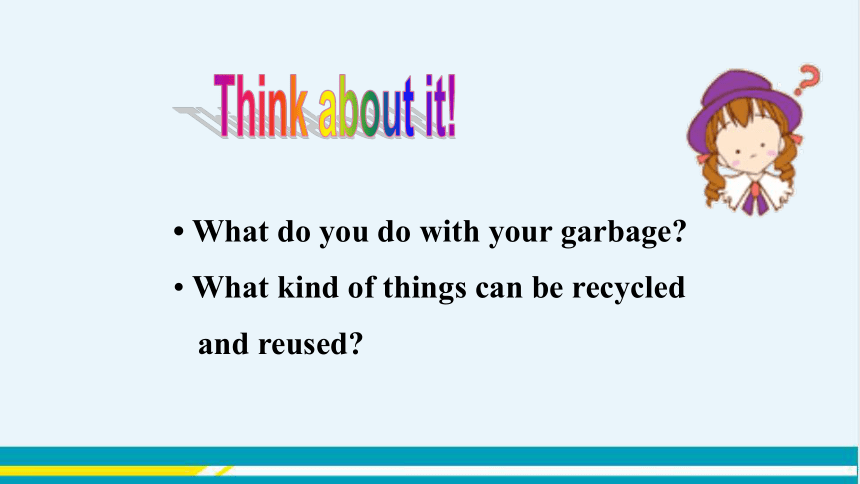
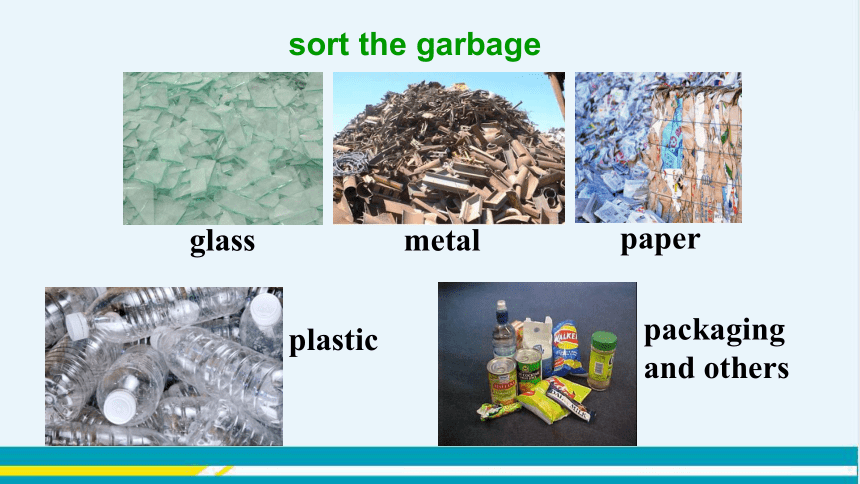
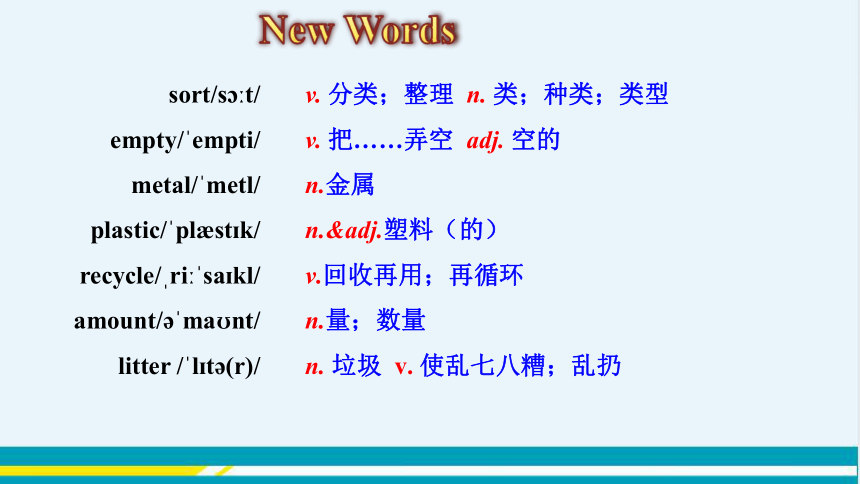
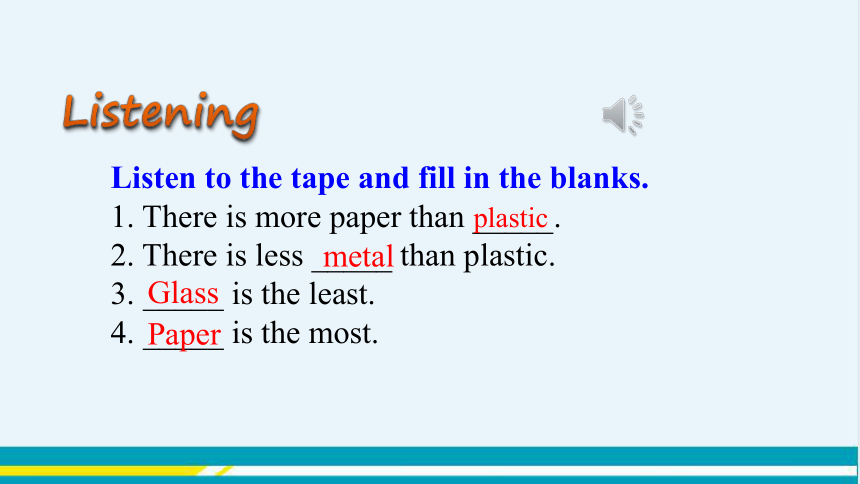
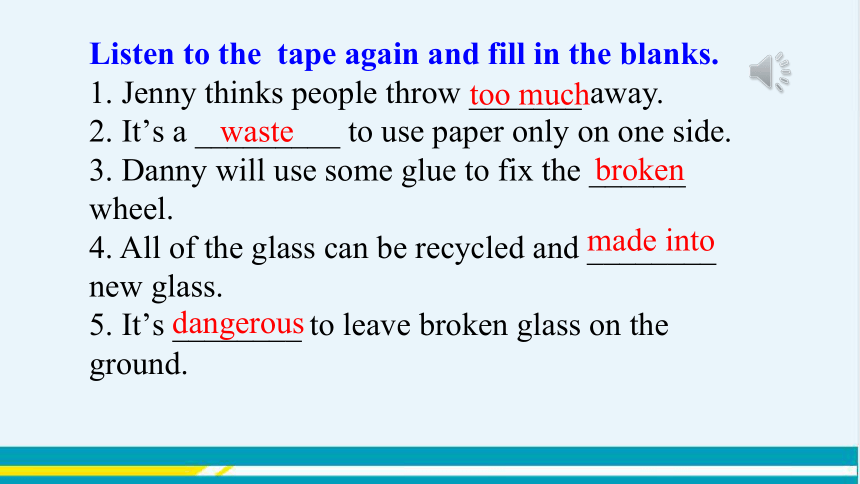
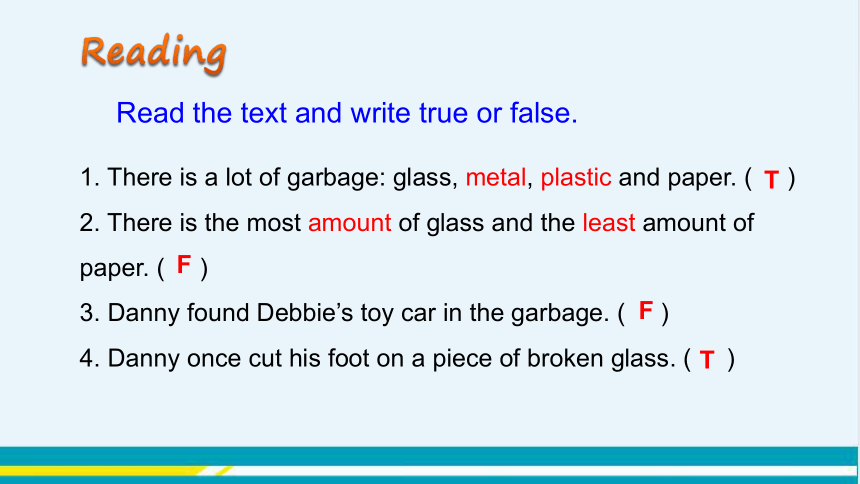
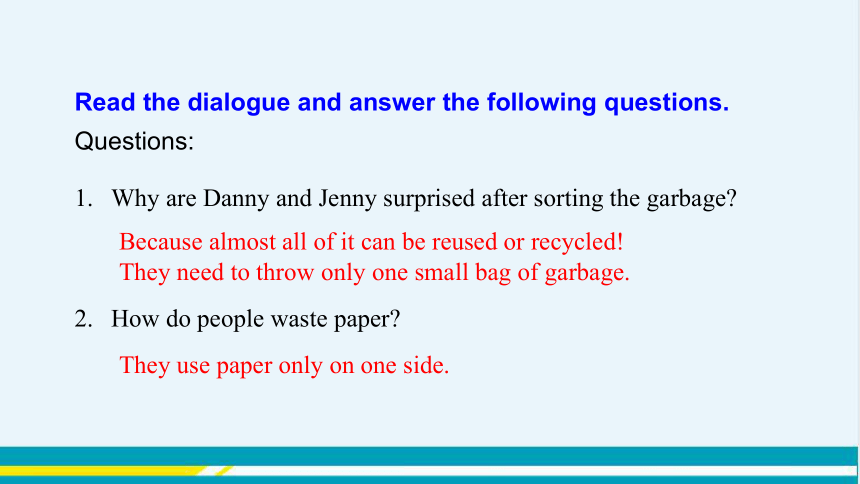
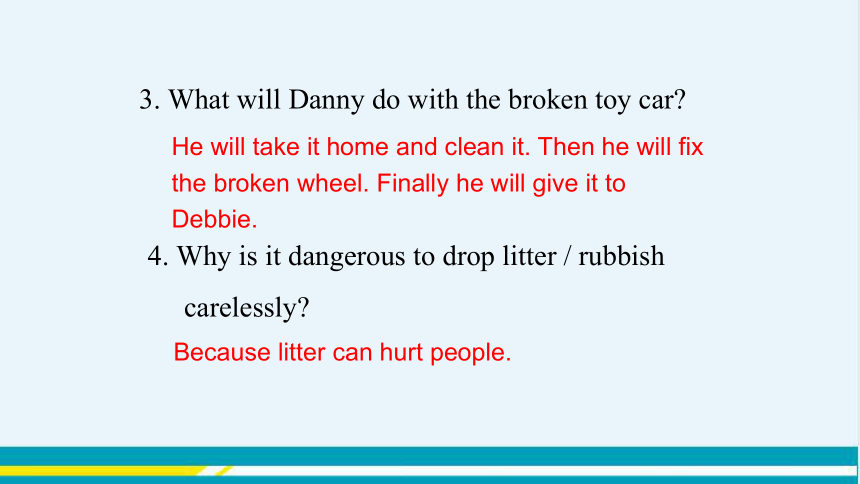
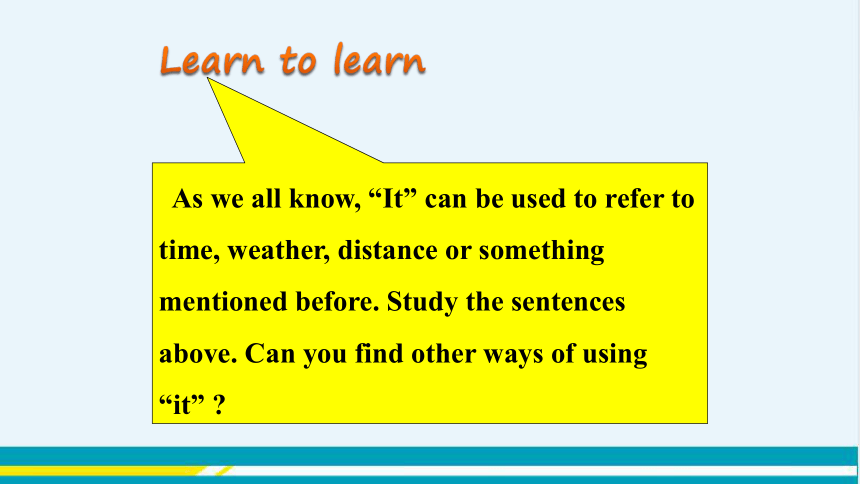
文档简介
(共31张PPT)
Lesson 45: Let’s Sort Garbage!
UNIT 8 Save Our World
学 习 目 标
掌握单词:empty, litter
接触单词:sort, metal, plastic, recycle
短语和句型:do with, be made into, People throw too much away. It is a waste to use paper only on the side.
1
3
倡导学生在日常生活中从小事做起,从自身做起,过低碳生活,保护环境。
听懂有关垃圾分类的介绍,了解垃圾分类的重要性。
2
They are dustbins/ garbage cans.
What do you do with your garbage
What are they
Lead in
课 堂 导 入
Think about it!
What do you do with your garbage
What kind of things can be recycled
and reused
sort the garbage
glass
metal
plastic
paper
packagingand others
sort/s t/
empty/ empti/
metal/ metl/
plastic/ pl st k/
recycle/ ri sa kl/
amount/ ma nt/
litter / l t (r)/
v. 分类;整理 n. 类;种类;类型
v. 把……弄空 adj. 空的
n.金属
n.&adj.塑料(的)
v.回收再用;再循环
n.量;数量
n. 垃圾 v. 使乱七八糟;乱扔
New Words
Listen to the tape and fill in the blanks.
1. There is more paper than _____.
2. There is less _____ than plastic.
3. _____ is the least.
4. _____ is the most.
Listening
plastic
metal
Glass
Paper
Listen to the tape again and fill in the blanks.
1. Jenny thinks people throw _______ away.
2. It’s a _________ to use paper only on one side.
3. Danny will use some glue to fix the ______ wheel.
4. All of the glass can be recycled and ________ new glass.
5. It’s ________ to leave broken glass on the ground.
too much
waste
broken
made into
dangerous
Read the text and write true or false.
1. There is a lot of garbage: glass, metal, plastic and paper. ( )
2. There is the most amount of glass and the least amount of paper. ( )
3. Danny found Debbie’s toy car in the garbage. ( )
4. Danny once cut his foot on a piece of broken glass. ( )
F
T
F
T
Reading
Read the dialogue and answer the following questions.
Questions:
Why are Danny and Jenny surprised after sorting the garbage
How do people waste paper
Because almost all of it can be reused or recycled! They need to throw only one small bag of garbage.
They use paper only on one side.
3. What will Danny do with the broken toy car
He will take it home and clean it. Then he will fix the broken wheel. Finally he will give it to Debbie.
4. Why is it dangerous to drop litter / rubbish carelessly
Because litter can hurt people.
As we all know, “It” can be used to refer to time, weather, distance or something mentioned before. Study the sentences above. Can you find other ways of using “it”
Learn to learn
Circle the words that “it” refers to in each sentences.
Example:
It is a waste to use paper only on one side.
1. It is fun to travel .
2. It is not right to waste things.
3. It is quite easy to find information with this program.
4. They think it is rude to point with a finger.
5. It is dangerous to leave broken glass on the ground.
Go for a walk around your neighbourhood. Take a bag with you and pick up any garbage you see. Wear gloves because garbage is dirty.
SORT THE GARBAGE
PROJECT
Bring the garbage to school. Don't throw it away!
What kind of garbage did you find?Sort the garbage. Make a pile for paper, plastic,metal, glass and other things.
·How much of each type of garbage do you have?
·What type do you have the least/most amount of?
Do you want to throw away the garbage now?Don't! What else could you do with it?Think!Could you use some of the garbage again?How
How could people make less garbage?Talk about this and write down your ideas.Now you can take out the garbage!
Language points
1.What do you do with your garbage?你怎样处理你的垃圾?
do with 处理。它常与疑问词what搭配使用。
What should I do with this problem?
我应该如何处理这个问题?
2. Danny empties two bags of garbage onto the floor.丹尼将两袋垃圾倒在地板上。
empty v. 倒空 adj. 空的
The streets began to empty after midnight.
午夜过后街上行人开始稀少了。
Vargas emptied his tool bag.
瓦格斯腾出自己的工具袋。
3.After they sort the garbage, Danny and Jenny are surprised.把垃圾分类之后,丹尼和詹妮很吃惊。
sort v.分类;整理。常用短语:sort out 把……整理好,分类。
I must sort out my clothes for the party.
我必须把聚会上要穿的衣服整理好。
The flowers should be watered every day.
花儿应该每天浇水。
Cars mustn’t be parked here.
小轿车不可以停放在这里。
4. Almost all of it can be reused or recycled!几乎所有东西都能被重复利用或循环利用!
1) 此句为含有情态动词的被动语态,其构成形式为:情态动词(can / may / must / should) +be + 过去分词。
2) re-是前缀,意思是“再,重新”。rewrite, replay, reappear, rebuild, remarry等。
reuse意思是“重新使用;再使用”。
She often reuses old envelopes.
她经常重复使用旧信封。
recycle意思是“使再循环;使……重新利用,重复利用”。
They recycle empty tins so as to use the metal.
他们回收空罐头盒以利用其金属。
5. People throw too much away.人们扔掉的太多。
【辨析】too much、too many与much too
too much:
too many:
much too:
太多,修饰可数名词的复数。
太……,修饰原级。
太多,修饰不可数名词或修饰比较级,含有“过分,难以接受”之意。
6. One of the wheels is broken.其中一个轮子坏了。
one of… ……之一。它后面跟可数名词复数。它作主语时,谓语动词用第三人称单数形式。
One of my friends comes from Canada.
我的一个朋友来自加拿大。
7. It's dangerous to leave broken glass on the ground.把碎玻璃留在地上是危险的。
(1)该句中it是形式主语,真正的主语是“to leave broken glass on the ground”。
(2)leave v.使保留;让……处于(某种状态、某地等)。其后可接名词、形容词、动词不定式、现在分词、过去分词或介词短语充当宾语补足语。
该句中 “leave broken glass on the ground” 的结构为“leave+名词+介词短语”。
Don't leave your socks on the sofa.
不要把你的袜子放在沙发上。
8. Once, I cut my foot on a piece of broken glass.有一次,我的脚被一块碎玻璃划破了。
a piece of 一张/一片/一块…… 它后面常跟不可数名词,但是要注意piece 是可数名词。该短语作主语时,谓语动词的数取决于piece的单复数形式。
I have a piece of good news to tell you.
我有一条好消息要告诉你。
cigarette butts
fruit peel
leftover
cell
paper
paper box
plastic
metal
glass
clothes
Let’s sort the garbage.
Sum up
It’ s very important for us to
sort the garbage in our daily life.
课 堂 达 标
I.用所给词的适当形式填空
1. I’d like three _________(glass) of water
2. It’s dangerous ________(leave) water here.
3. Jenny ________(empty) the garbage every Sunday.
4. Not all the rubbish can ________(reuse).
5. I can help Li Feng ________(sort) the garbage.
glasses
to leave
empties
be reused
sort
Ⅱ.完成句子
1.你怎样处理这个问题啊?
What do you ______ _______your problem
2.晓红今天晚上吃得太多了。
Xiaohong ate _____ _______tonight.
3.其中一封信是王明的。
_____ ______ the letters ______ Wang Ming’s.
4.她捡起了地上的一张纸。
She picked up _____ ______ ______paper on the floor.
do with
too much
One of is
a piece of
1. Finish exercises of Lesson 45.
2. Preview next lesson.
3. Tell your parents and your friends about the knowledge we have learnt today and sort and reuse garbage together.
Homework
Thank you !
Lesson 45: Let’s Sort Garbage!
UNIT 8 Save Our World
学 习 目 标
掌握单词:empty, litter
接触单词:sort, metal, plastic, recycle
短语和句型:do with, be made into, People throw too much away. It is a waste to use paper only on the side.
1
3
倡导学生在日常生活中从小事做起,从自身做起,过低碳生活,保护环境。
听懂有关垃圾分类的介绍,了解垃圾分类的重要性。
2
They are dustbins/ garbage cans.
What do you do with your garbage
What are they
Lead in
课 堂 导 入
Think about it!
What do you do with your garbage
What kind of things can be recycled
and reused
sort the garbage
glass
metal
plastic
paper
packagingand others
sort/s t/
empty/ empti/
metal/ metl/
plastic/ pl st k/
recycle/ ri sa kl/
amount/ ma nt/
litter / l t (r)/
v. 分类;整理 n. 类;种类;类型
v. 把……弄空 adj. 空的
n.金属
n.&adj.塑料(的)
v.回收再用;再循环
n.量;数量
n. 垃圾 v. 使乱七八糟;乱扔
New Words
Listen to the tape and fill in the blanks.
1. There is more paper than _____.
2. There is less _____ than plastic.
3. _____ is the least.
4. _____ is the most.
Listening
plastic
metal
Glass
Paper
Listen to the tape again and fill in the blanks.
1. Jenny thinks people throw _______ away.
2. It’s a _________ to use paper only on one side.
3. Danny will use some glue to fix the ______ wheel.
4. All of the glass can be recycled and ________ new glass.
5. It’s ________ to leave broken glass on the ground.
too much
waste
broken
made into
dangerous
Read the text and write true or false.
1. There is a lot of garbage: glass, metal, plastic and paper. ( )
2. There is the most amount of glass and the least amount of paper. ( )
3. Danny found Debbie’s toy car in the garbage. ( )
4. Danny once cut his foot on a piece of broken glass. ( )
F
T
F
T
Reading
Read the dialogue and answer the following questions.
Questions:
Why are Danny and Jenny surprised after sorting the garbage
How do people waste paper
Because almost all of it can be reused or recycled! They need to throw only one small bag of garbage.
They use paper only on one side.
3. What will Danny do with the broken toy car
He will take it home and clean it. Then he will fix the broken wheel. Finally he will give it to Debbie.
4. Why is it dangerous to drop litter / rubbish carelessly
Because litter can hurt people.
As we all know, “It” can be used to refer to time, weather, distance or something mentioned before. Study the sentences above. Can you find other ways of using “it”
Learn to learn
Circle the words that “it” refers to in each sentences.
Example:
It is a waste to use paper only on one side.
1. It is fun to travel .
2. It is not right to waste things.
3. It is quite easy to find information with this program.
4. They think it is rude to point with a finger.
5. It is dangerous to leave broken glass on the ground.
Go for a walk around your neighbourhood. Take a bag with you and pick up any garbage you see. Wear gloves because garbage is dirty.
SORT THE GARBAGE
PROJECT
Bring the garbage to school. Don't throw it away!
What kind of garbage did you find?Sort the garbage. Make a pile for paper, plastic,metal, glass and other things.
·How much of each type of garbage do you have?
·What type do you have the least/most amount of?
Do you want to throw away the garbage now?Don't! What else could you do with it?Think!Could you use some of the garbage again?How
How could people make less garbage?Talk about this and write down your ideas.Now you can take out the garbage!
Language points
1.What do you do with your garbage?你怎样处理你的垃圾?
do with 处理。它常与疑问词what搭配使用。
What should I do with this problem?
我应该如何处理这个问题?
2. Danny empties two bags of garbage onto the floor.丹尼将两袋垃圾倒在地板上。
empty v. 倒空 adj. 空的
The streets began to empty after midnight.
午夜过后街上行人开始稀少了。
Vargas emptied his tool bag.
瓦格斯腾出自己的工具袋。
3.After they sort the garbage, Danny and Jenny are surprised.把垃圾分类之后,丹尼和詹妮很吃惊。
sort v.分类;整理。常用短语:sort out 把……整理好,分类。
I must sort out my clothes for the party.
我必须把聚会上要穿的衣服整理好。
The flowers should be watered every day.
花儿应该每天浇水。
Cars mustn’t be parked here.
小轿车不可以停放在这里。
4. Almost all of it can be reused or recycled!几乎所有东西都能被重复利用或循环利用!
1) 此句为含有情态动词的被动语态,其构成形式为:情态动词(can / may / must / should) +be + 过去分词。
2) re-是前缀,意思是“再,重新”。rewrite, replay, reappear, rebuild, remarry等。
reuse意思是“重新使用;再使用”。
She often reuses old envelopes.
她经常重复使用旧信封。
recycle意思是“使再循环;使……重新利用,重复利用”。
They recycle empty tins so as to use the metal.
他们回收空罐头盒以利用其金属。
5. People throw too much away.人们扔掉的太多。
【辨析】too much、too many与much too
too much:
too many:
much too:
太多,修饰可数名词的复数。
太……,修饰原级。
太多,修饰不可数名词或修饰比较级,含有“过分,难以接受”之意。
6. One of the wheels is broken.其中一个轮子坏了。
one of… ……之一。它后面跟可数名词复数。它作主语时,谓语动词用第三人称单数形式。
One of my friends comes from Canada.
我的一个朋友来自加拿大。
7. It's dangerous to leave broken glass on the ground.把碎玻璃留在地上是危险的。
(1)该句中it是形式主语,真正的主语是“to leave broken glass on the ground”。
(2)leave v.使保留;让……处于(某种状态、某地等)。其后可接名词、形容词、动词不定式、现在分词、过去分词或介词短语充当宾语补足语。
该句中 “leave broken glass on the ground” 的结构为“leave+名词+介词短语”。
Don't leave your socks on the sofa.
不要把你的袜子放在沙发上。
8. Once, I cut my foot on a piece of broken glass.有一次,我的脚被一块碎玻璃划破了。
a piece of 一张/一片/一块…… 它后面常跟不可数名词,但是要注意piece 是可数名词。该短语作主语时,谓语动词的数取决于piece的单复数形式。
I have a piece of good news to tell you.
我有一条好消息要告诉你。
cigarette butts
fruit peel
leftover
cell
paper
paper box
plastic
metal
glass
clothes
Let’s sort the garbage.
Sum up
It’ s very important for us to
sort the garbage in our daily life.
课 堂 达 标
I.用所给词的适当形式填空
1. I’d like three _________(glass) of water
2. It’s dangerous ________(leave) water here.
3. Jenny ________(empty) the garbage every Sunday.
4. Not all the rubbish can ________(reuse).
5. I can help Li Feng ________(sort) the garbage.
glasses
to leave
empties
be reused
sort
Ⅱ.完成句子
1.你怎样处理这个问题啊?
What do you ______ _______your problem
2.晓红今天晚上吃得太多了。
Xiaohong ate _____ _______tonight.
3.其中一封信是王明的。
_____ ______ the letters ______ Wang Ming’s.
4.她捡起了地上的一张纸。
She picked up _____ ______ ______paper on the floor.
do with
too much
One of is
a piece of
1. Finish exercises of Lesson 45.
2. Preview next lesson.
3. Tell your parents and your friends about the knowledge we have learnt today and sort and reuse garbage together.
Homework
Thank you !
同课章节目录
- Unit 1 Spring Is Coming
- Lesson 1 How's the weather?
- Lesson 2 It's Getting Warmer!
- Lesson 3 Sun Is Rising
- Lesson 4 The Spring City
- Lesson 5 Babysitting on a Spring Day
- Lesson 6 Stories about Spring
- Unit 2 Plant a Plant
- Lesson 7 Planting Trees
- Lesson 8 Why Are Plants Important?
- Lesson 9 Gardening with Mary
- Lesson 10 Make Your Garden Grow!
- Lesson 11 Amazing Plants
- Lesson 12 Danny's Plant
- Unit 3 Animals Are Our Friends
- Lesson 13 Danny's Big Scare
- Lesson 14 Amazing Animals
- Lesson 15 The Zoo Is Open
- Lesson 16 The Pear Escaped
- Lesson 17 Save the Tigers
- Lesson 18 Friendship Between Animals
- Unit 4 The Internet Connects Us
- Lesson 19 How Do You Use the Internet?
- Lesson 20 A Computer Helps!
- Lesson 21 Books or Computers?
- Lesson 22 Travel on the Internet
- Lesson 23 The Internet--Good or Bad?
- Lesson 24 An E-mail to Grandpa
- Unit 5 Buying and Selling
- Lesson 25 Raising Money
- Lesson 26 Cookies, Please!
- Lesson 27 Business English
- Lesson 28 Ms. Liu's Great Idea
- Lesson 29 How to Push a Product
- Lesson 30 A Cookie Sale
- Unit 6 Be a Champion!
- Lesson 31 Don't Fall, Danny
- Lesson 32 My Favourite Record
- Lesson 33 2800 Years of Sports
- Lesson 34 Modern Olympics
- Lesson 35 The Dream Team
- Lesson 36 Classroom Olympics
- Unit 7 Know Our World
- Lesson 37 Let's Learn Geography!
- Lesson 38 The World Is a Big Place
- Lesson 39 Ring Up or Call?
- Lesson 40 Body Language
- Lesson 41 A Class of the World
- Lesson 42 North America
- Unit 8 Save Our World
- Lesson 43 Let's Clean Up!
- Lesson 44 Environment Clubs
- Lesson 45 Let's Sort Garbage!
- Lesson 46 Protect Our Environment
- Lesson 47 Connected to Nature
- Lesson 48 Garbage Is Interesting!
